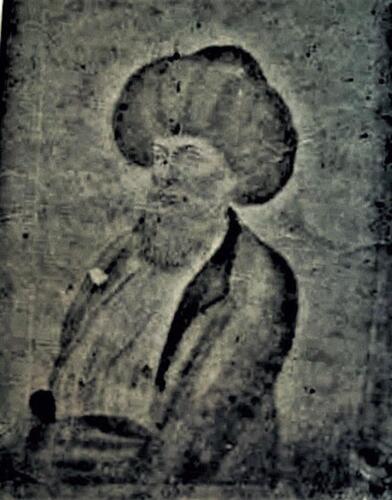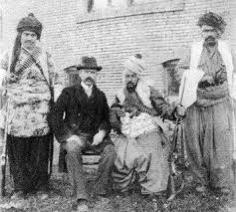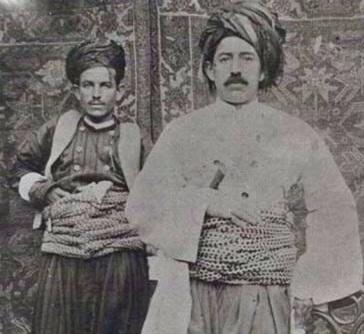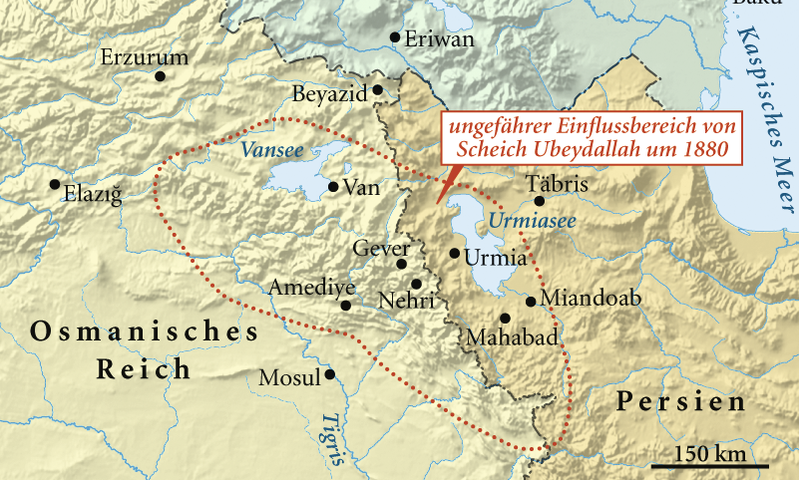After the defeat and surrender of Badir Khan Pasha, many of his subordinates lost power, were expelled and were killed; despair swept all over Kurdistan. If previously there was a fair and just government in this vast geography and the country was largely peaceful as the sources indicate, after that incident, the invaders of Kurdistan entrusted the areas under the rule of Badir Khan to their officials and invasion and suppression took justice place. But the seeds that Badir Khan had sown were not useless. Although the structure of the feudal system in Kurdistan was distorted, another structure gradually replaced it. The religious system had its roots in Kurdistan for many years. There were many pioneers of this movement whom history has named, but one of the most prominent among them was Sheikh Obaidullah Nahri. The change that Sheikh Obaidullah brought about in this system is remarkable. By studying the behavior and lifestyle of his predecessors and the relationship between their spiritual power and the Kurdish people, Sheikh Nahri had concluded that the leader and disciple system would produce nothing but monasteries and persecution and instead of taking part in social life people would choose solitary in Khanaqa’s corners and this way of life would lead them to rely on heavenly fate. But Sheikh Obaidullah wanted to bring the relationship down to the ground. In other words, power for him was not a religious power to develop a particular religion, but a power to build a ground force for the Kurdish nation. In other words, Sheikh Obaidullah Nahri tried to combine the two bases of religious and national power and introduce their synthesis as the third phenomenon, thus creating an opportunity for a Kurdish government. Therefore, he appeared as a nationalist religious leader and intensified his efforts in this direction.
Sheikh Obaidullah was born in 1827 in Shamzinan. He died in 1884 in exile in Mecca, Hijaz.

The sheikhs of Shamzinan believed that their ancestry went back to Sheikh Abdul Qadir Geylani. He is the founder of the Qadiri sect. That position and background gave them a tremendous strength. Unlike his predecessors and the sheikhs of the sect, Sheikh Obaidullah tried to get involved in social movements. From 1877 to 1878, Sheikh Obaidullah fought with a group of Kurds in the Russian-Ottoman war and was severely defeated. However, he did not give up on the conflict and political and armed affairs and became famous as the leader of the Kurds. Because of his simple, loyal, and protective behavior, he played the role of a political leader and at the same time a leader and prophet.
The difference between Sheikh Obaidullah Nahri and the rest of the Kurdish sheikhs up to that time was; that he had added a nationalist flavor to his movement. He was a nationalist and serious about Kurdish affairs and believed in the independence of his people. Sheikh Nahri wanted to unite Ottoman and Iranian Kurdistan and form a unified state.
In the first writing from Kurdish nationalism available as a statement, Sheikh Obaidullah Nahri wrote to a representative of the Western forces who was his friend: “All Kurdish leaders and emirs in Iran and Ottoman believe they cannot work and continue their political life with them. Something must be done to make the European forces aware of this issue and look into it so that they know that the Kurdish people are different people and ... we want to take our own affairs.”
He led the Kurdish revolution from “Hakari”, which was part of the Ottoman Empire. From 1879 to 1880, he conquered all the areas between Lake Van and Lake Urmia with the help of Kurdish tribal chiefs, Hamzaghai Mangur, the chief of the Mangur tribe, and the Harki tribe. As mentioned earlier, the Sheikh wrote a letter for a Western friend that summarizes his political thoughts.

The letter shows the level of sensitivity of Sheikh Nahri towards his nation and the character of a rights-seeking nationalist who clearly expresses his national aspirations. Sheikh Obaidullah Nahri talks about the differences between his identity and the surrounding nations. He has no nervous vision. In other words, he does not talk about the evil of the other and the superiority of his own nation but emphasizes the differences. He says that because of these differences, the Kurdish nation has been marginalized and attacked from both sides and its rights have been violated, which has caused the Kurdish nation's misery. To get out of this situation, the nation must have its own ruling. Interestingly, Sheikh Obaidullah Nahri also recognized that the international community must understand the essence of the problem. Therefore, in this statement, he tried to present his analysis and ask the European countries to do their own examination to understand the essence of the Kurdish problem and know that the solution to this problem and its resolution requires a political decision.
Sheikh Obaidullah Nahri took action in this regard and led two revolutions. The first was in 1879 in Badinan and the second in 1880 in Iran.

Some historians, including Qaidari, say: “The movement that emerged during the reign of Nasiruddin Shah Qajar instilled great fear in the heart of the Qajar state. This revolution was, in fact, a revolution done by the poor class of the society against political and social dominant circumstances at that time in Iran and Kurdistan and it was a reformist attempt to show the incompetence of the Qajar state, but due to the lack of a specific strategy and proper knowledge of international politics by the leadership of the movement, as well as the bad role of Russia and even the United States. Some researchers point to the breakdown of relations between the Shamzinan sheikhs and the central government of Iran. Apparently, a daughter of the Nahri family, the sister/or daughter of Sayid Taha Nahri, father of Sheikh Obaidullah, became the bride of the Qajar family; and “Abbas Mirza” was the son of Shah. Therefore, several villages in the border area were given to the Nahri family and taxes were not taken from them. But Naseeruddin Shah's mother, “Mahdi Olya”, did something to put pressure on the region and the conflict could be sparked. On the other hand, it is said that Britain intentionally wanted the region to become tense, so its representatives and the followers of Sheikh Obaidullah, encourage him saying how someone like you, who is called "Master" and "Hazrat", subjugated people who are more unworthy than you and you should be in the power, etc. All of these caused the Sheikh to prepare himself to attack Kurdistan under Iranian rule. However, the bad role of Lutf Ali Khan, the governor of Sablagh, caused a lot of suffering to the people, especially putting a lot of pressure on Hamzagha Mangur, even making it difficult for him to travel to his properties. That is why he was even more tempted to join the revolution of Sheikh Nahri against the corrupt and oppressive regime. Despite all these opinions, it can be said that each of the reasons seems to hide some truth, in other words, all the statements are true. But what was crucial was that Sheikh Obaidullah tried to establish a Kurdish government in the nineteenth century. His government was not specific to one part of Kurdistan and gathered the strength of all parts of Kurdistan. In alliance with the Mangur, Harki, and other tribes, he tried to unite the Kurdish forces. He started his revolution by attacking Iranian-controlled Kurdistan, but due to his lack of understanding of the international situation, lack of special plans and the behavior of his army, especially in the Miandwaw and Malkandi regions, he faced opposition from regional and international forces. He was defeated finally and the Sheikh was exiled to the Hijaz and Mecca, where he died.








